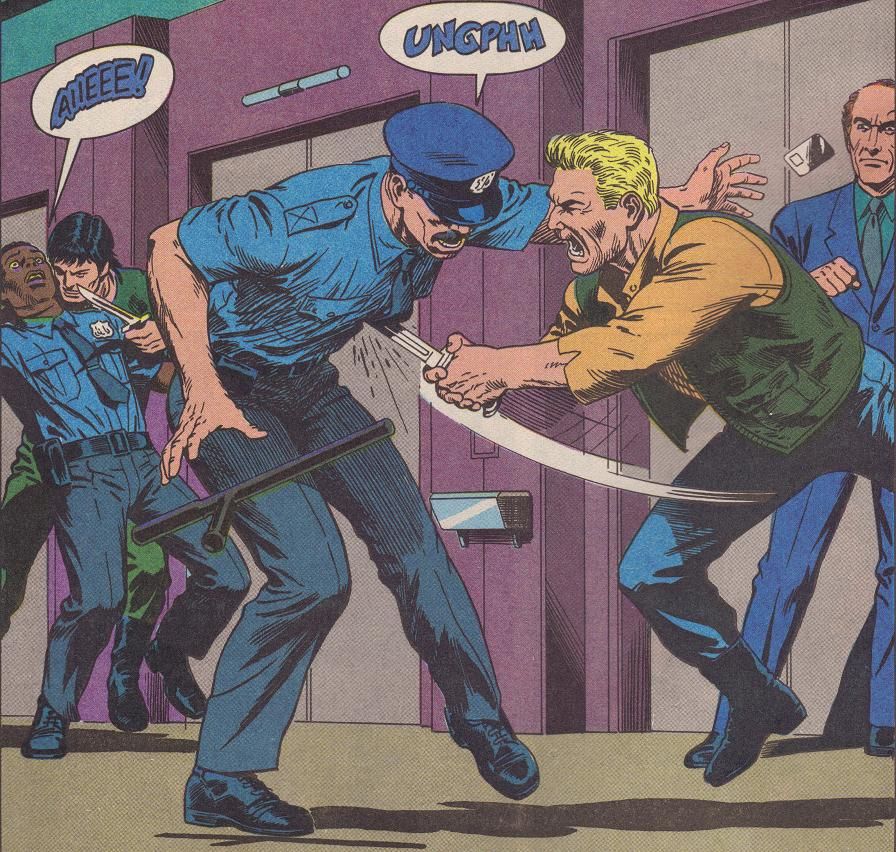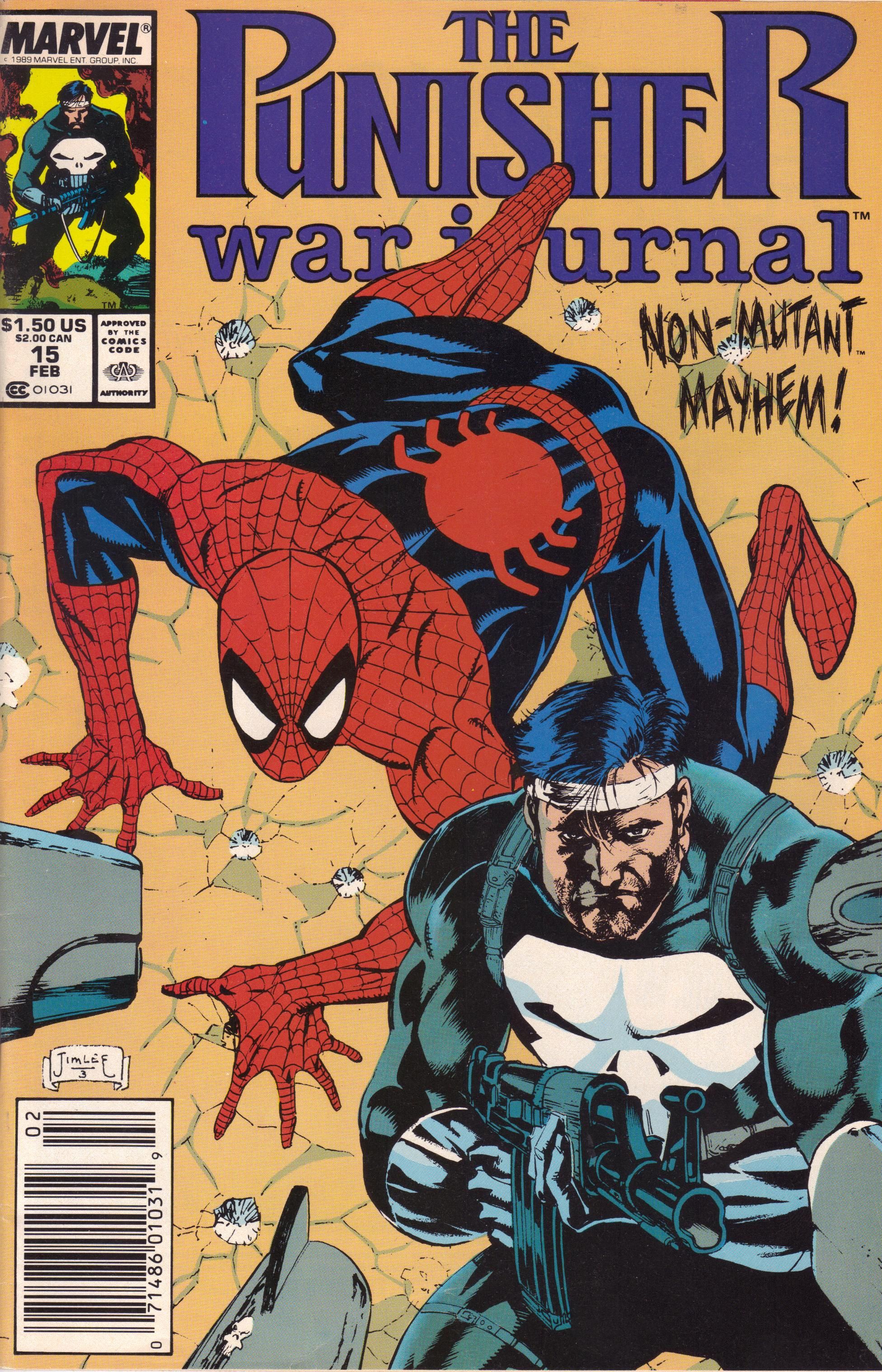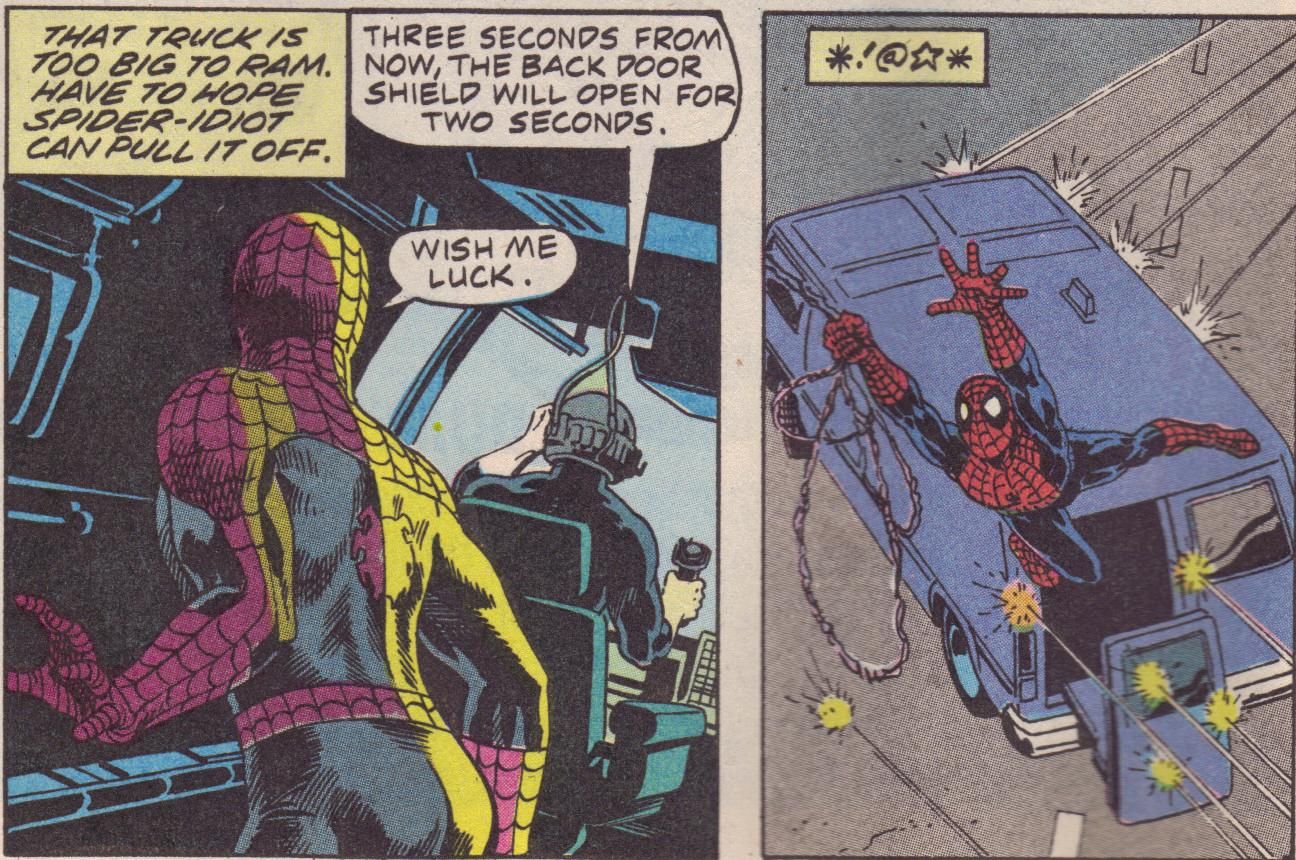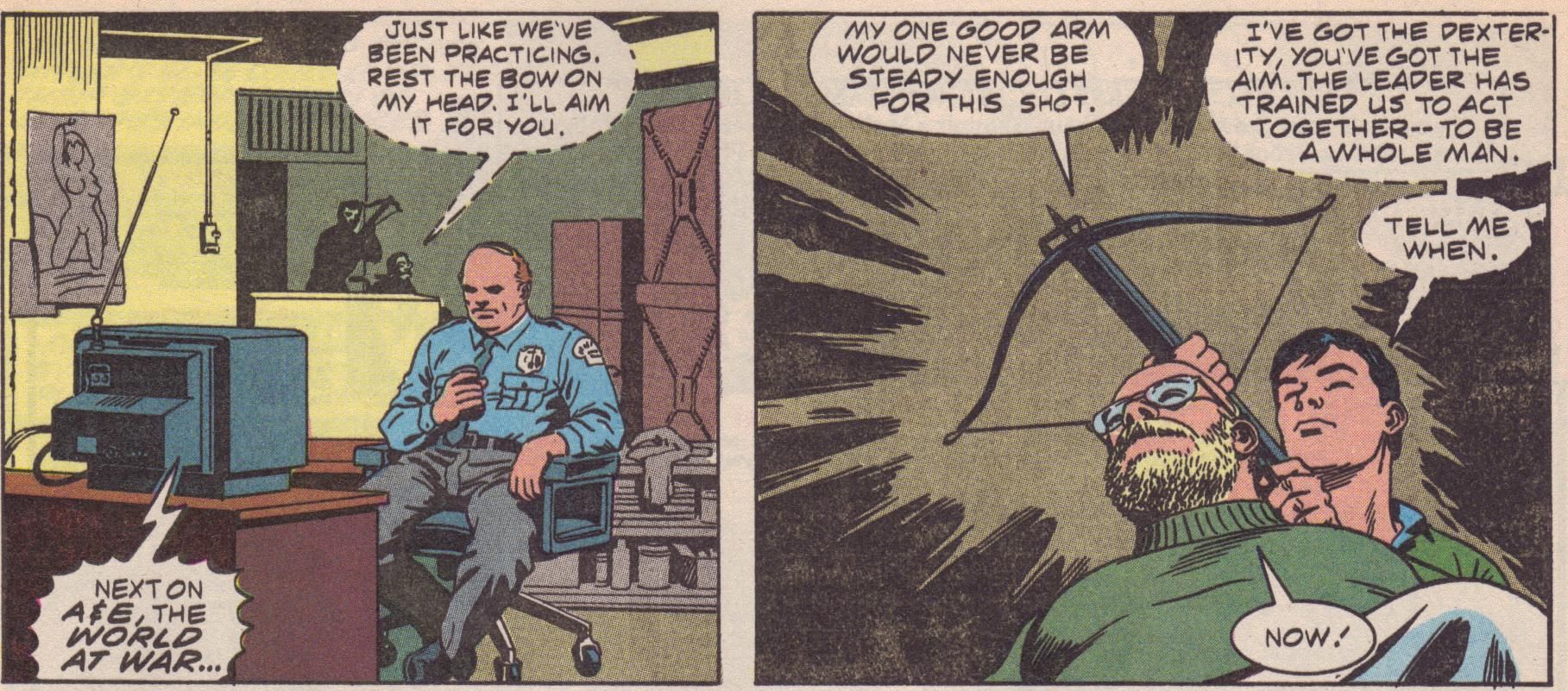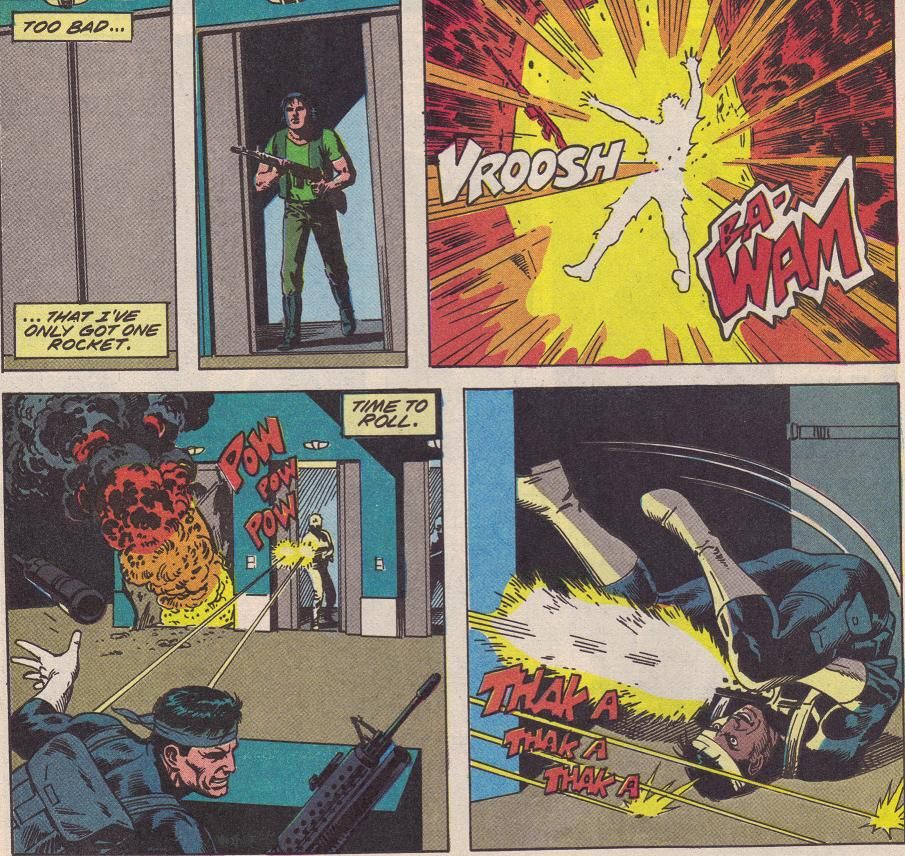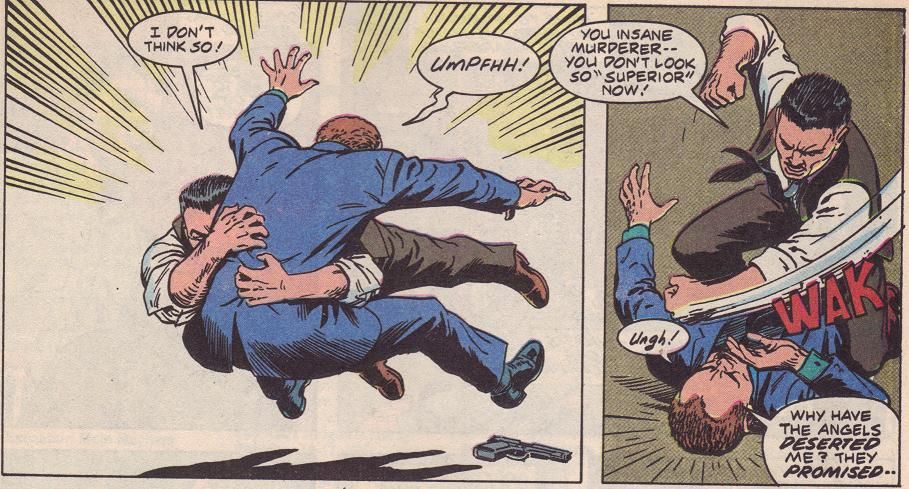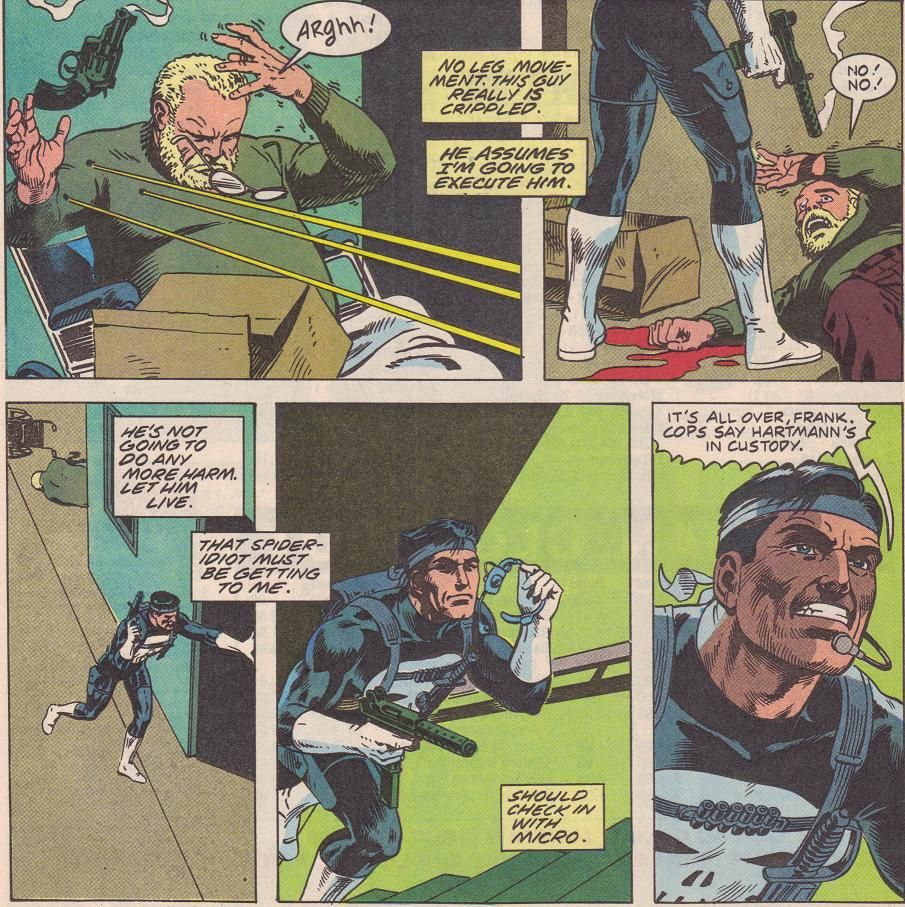It's really astonishing to consider how many mediocre comics there are out there. Not good, but not bad enough to mock. Such is the case with our latest installment from deep in the back issue box. There's nothing very good about this comic, but there's nothing truly terrible, either. But will it bring back the first-time reader? Ah, that's an entirely different question, isn't it?
First, let's consider the ground rules for these posts. As always, I just want to figure out whether this particular comic would work as someone's first and whether it would entice them back. And here we have The Punisher War Journal #15 (the story is named "Headlines!"), written by Carl Potts, drawn by David Ross, inked by Russ Heath, of all people, lettered by Jim Novak, and colored by Gregory Wright. It was published by Marvel and its cover date is February, 1990.
I find it humorous that many Marvel books back then had something on their cover exclaiming that they weren't involved with mutants, as this one proudly states it contains "non-mutant mayhem." Maybe Marvel should start doing that with their non-Avengers stuff these days: "No Avengers at ALL!" or something like that. But what's up with this issue?
Helpfully, we get a brief synopsis at the top of page one: The Punisher and Spider-Man fought some neo-Nazis who wanted revenge on anyone connected to the Daily Bugle because of an article in that fine newspaper that they thought was, get this, slanderous.
So nine neo-Nazis (isn't that in the Christmas song?) head to the Bugle headquarters to cause some trouble. They don't even try to do it sneakily - the leader tells the guard that he's Eric Hartmann and that he wants the guard's key card to access the elevators. When the guard tells him, "Fuck you and the horse you rode in on!" (fret not, the bad word is grawlixed out), Hartmann and his thugs kill him and steal the key card. Well, that sucks. I should point out that in the first panel, there's a Thoreau quote: "If anything ails a man, so that he does not perform his functions, if he has a pain in his bowels even ... he forthwith sets about reforming the world." I have read this issue, and I have no idea why Potts uses that quote. It's very weird.
Hartmann and his thugs reach the offices, where of course a certain Mary Jane Watson-Parker is hanging out, picking up her husband's check (we don't know she's Spider-Man's wife yet, but we will soon enough). Hartmann bursts into J. Jonah Jameson's office (he helpfully refers to Jameson by his full name), but then we get a scene shift to Spider-Man and the Punisher, who are in upstate New York (and it's twenty minutes later, according to the caption box). Apparently the neo-Nazis have surrounded the Punisher's van and are blasting away, and the van's armor can't hold up much longer.
The Punisher says they can blast their way out in no time, or they can try Spider-Man's "pollyanna" approach and risk a delay that could get Hartmann's hostages killed. In a though balloon, Spidey lets us know that Mary Jane is at the Bugle and is someone important to him - an astute reader will put two and two together and understand that Spider-Man is, in fact, the husband referred to on the previous page. And we're all astute readers, aren't we? Spider-Man also knows that Mary Jane wouldn't want him to take the Punisher's way and kill a bunch of people to get out, even to save her. So he asks the Punisher to let him out the back. Spidey, of course, kicks ass, so the heroes can leave, even though the Punisher points out that they could have left ten minutes ago. He's kind of a jerk, isn't he?
Back at the Bugle, Hartmann is whining because Jameson made his neo-Nazi philosophy look bad. He's convinced that if he gets his message to the masses directly, they'll see the logic of it and rise up. Jameson tells him he won't cooperate, but why not? The best thing you can do for hate-filled people is to give them a platform, because then everyone can see they're hate-filled and ignore them. If you block their access, people will just think you're scared of their message and take it more seriously. Jameson should have told Hartmann he'd give him the entire newspaper for a day, so that people would know what a loon he was. Hartmann picks a hostage and is about to slit her throat, but Jameson caves. Hartmann asks him where the other guards are, and Jameson tells him there's only one, down by the loading dock. Two of Hartmann's minions go down and shoot him in the back with a crossbow arrow.
Get this - one of the bad guys is in a wheelchair and has only one good arm, and his pal is blind. The dude who can walk rests the crossbow on his friend's head, and that guy steadies the bow and helps him aim. I guess that's fairly enlightened of Hartmann, that he'd let two disabled people into his little band, but it's still rather odd to see. Don't those two guys know what the real Nazis did to handicapped people?
Hartmann is on Jameson's computer, writing his story. He reminisces about his childhood, at the end of World War II, when he was smuggled out of Germany after Hitler's suicide. He was raised in South America with two girls he calls his "sisters," but one day they vanished and he swore he'd never stop searching for them. He arrived in the U. S. and one day saw a bright light in the woods. He believed he saw an angel who told him to take up the Nazi cause, and since then he's been building an army. Potts interrupts this reverie to show a police helicopter flying over the building, but two of Hartmann's goons bring it down with a bazooka. In retaliation, Hartmann orders one of his men to throw a hostage out the window. That's just not very nice.
The Punisher and Spidey have reached the city. The Punisher gets word from Micro (who we never see in this issue but we understand to be his ally in the war on crime) about the helicopter and the hostage, and he tells Spider-Man that he's not going easy on them anymore. He infiltrates the building through the sewers while Spidey goes high. While the Punisher moves underground, Micro gives him some information about Hartmann - how he lost his family and attached himself to a doctrine that gives his life meaning.
The Punisher flashes back to people getting killed, and although Potts doesn't go into it, readers can figure out that people close to the Punisher were killed and he, too, needs a mission to give his life meaning. Micro explains the angel of light as a clinical phenomenon to the Punisher, but he says no one knows what causes the visions. As Spider-Man reaches the office where Mary Jane is being held, the Punisher comes up into the building and stabs one of the bad guys. Unfortunately, his gun goes off and alerts the others. So there's some gunplay, but Hartmann's manifesto managed to ship. Dang, that's quick! Hartmann sends a few of his goons down to kill the Punisher, and Spidey sees his opportunity. Downstairs, the Punisher kills the bad guys and announces on the walkie-talkie that he's the angel of death. Hartmann almost believes, but the guy in the wheelchair can hear the Punisher's voice, so he knows it's not a real angel. Hartmann wonders why no one is rising up - um, dude? the trucks just left, so I doubt anyone has even read your message yet, but I get that you're delusional, so it's okay. He tells the dude in the wheelchair and his buddy to take the papers and distribute them manually - they should pose as hostages that he released to get out of the building. Once he's alone, Spidey bursts in, but not in time to stop Hartmann from grabbing Mary Jane. Oh dear.
Hartmann takes Mary Jane to the window and realizes that he can chuck her out and get away from Spidey, who will have to rescue her. So he does, and Spidey rescues her, but before Hartmann can pick up his gun, Jameson tackels him and beats him up. Hartmann looks out the window and sees the sunlight reflecting in and believes it's his angel.
But then he thinks he sees two forms - his "sisters" - and they are sorely disappointed in him for not finding them and for not committing suicide when he failed. Hartmann doesn't even realize that Jameson is tying him up, because he's lost in his delusion.
Downstairs, the Punisher sees the two guys Hartmann sent out get off the elevator, and at first he thinks they're hostages, until he sees the crossbow bolts the dude is carrying ... in his back pocket, which is kind of convenient for the Punisher. He confronts the blind guy, but wheelchair dude tries to shoot him in the back. The Punisher ducks, the bullet kills the blind guy, and the Punisher shoots the dude in the wheelchair. He's not dead, but the Punisher lets him live because "he's not going to do any more harm." He does ruminate that the "Spider-idiot" must be getting to him, because even though the guy is disabled, he's still a member of a neo-Nazi group that just killed a bunch of people. Come on, Punisher! As he walks up the stairs, he sees Mary Jane and Spider-Man on a landing, and Spidey takes his mask off and hugs his wife.
He's in shadow, so we can't see his face, and the Punisher doesn't talk to them. He just walks away, all alone.
As I wrote at the top, this is kind of a dull comic. Potts gives us enough information to follow along, and even though he doesn't tell us much about Spider-Man, that's okay because this isn't a Spider-Man comic and if you're reading a comic book and you don't know who Spider-Man is, you might want to check where you've been living your entire life, because it's probably under a rock. We get enough information about the Punisher, including that his name is Frank, to keep up. Even though this is the final part of a story arc (I'm going to assume it's only part two), it's easy enough to figure out what's going on. This is somewhat mediocre, but it is also very first-reader-friendly. We get a fairly okay story, one that doesn't require you to pick up any others (even the one that preceded it), and we get a sense of what the Punisher is all about. Potts even manages to introduce some doubt into the Punisher's "mission," as he leaves the guy in the wheelchair alive. It's not a very memorable comic, but it does what it's supposed to do - tell a story and gives you every reason to come back. That's not a bad thing.

